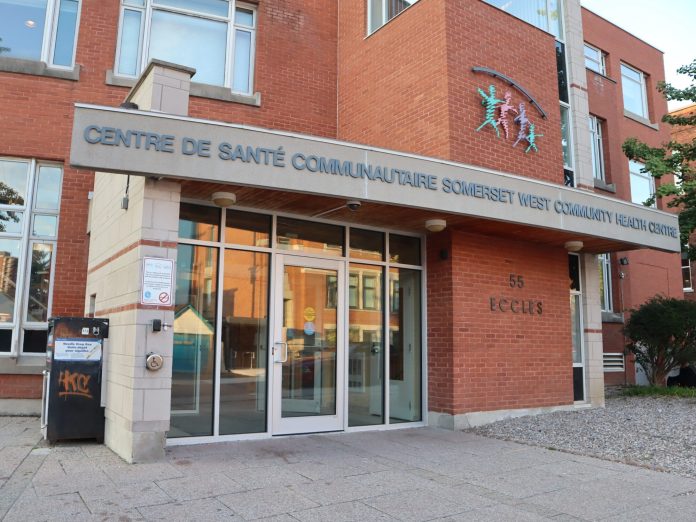Health agencies are warning public drug use and unlawful behavior in Centretown will get worse after the Somerset West Community Health Centre is forced to close its safe consumption site next March.
The upcoming closure comes after the Ontario government announced during the Association of Municipalities Ontario Conference in Ottawa that new laws would be enacted that will effectively ban injection sites within 200 meters of schools or childcare facilities.
“Communities, parents and families across Ontario have made it clear that the presence of consumption sites near schools and daycares is leading to serious safety problems,” said Sylvia Jones, the province’s Minister of Health, at the conference.
“We need to do more to protect public safety, especially for young school children, while helping people get the treatment they need,” she continued. “That’s why we’re taking the next step to expand access to a broad range of treatment and recovery services, while keeping kids and communities safe.”
There are some questions as to why the Somerset site was one of 10 in the province ordered to close. St. Anthony Catholic School is located about 400 meters away, but Nanny Goat Hill Nursery School on Somerset Street West is about 180 meters.
The Ontario government said the closure in Centretown is the result of a 146 per cent increase in crime reported in the area.
Speaking at a news conference hours after the announcement, Somerset West CHC executive director Suzanne Obiorah said the policy change came as an unwelcome surprise that they first heard about in the media.
“We have not had any opportunity to engage with the provincial government prior to this message,” she said. “We are gravely concerned that the decision to defund and close consumption and treatment services will have devastating consequences for our community.”
Obiorah said the Somerset facility on Eccles Street was first chosen as a safe injection site because the community had the second-highest rate of death and blood-borne infections in Ottawa caused by illicit street drugs.
Last year alone, 487 overdoses were treated at the centre, calls that otherwise would have gone through 9-1-1. There were also over 7,000 referrals for various support services like housing, addictions treatment and counseling.
New addiction treatment support coming
Despite safe injection sites are being defunded, a $378-million investment has been dedicated to setting up new “HART model” homelessness and addiction recovery treatment hubs. They will provide primary care, mental health services, addiction care support, social services/employment support, shelter and transition beds, supportive housing, and other services, like naloxone treatment.
While the new model is welcomed by community groups, the program will not include supervised consumption, a safe supply of drugs, or needle exchange programs.
The Sandy Hill Community Health Centre is one of seven allowed to stay open in the province, and the centre said it expects to see a large influx of community users heading downtown to access their services.
“This is a supply and demand problem, and reductions of one service to redirect services to another will not serve our issue,” said Robin McAndrew, executive director of the Sandy Hill Centre. “We are going to need to prepare for serious impact in lives lost, impact on emergency services and societal disorder. The HART model will be a wonderful addition, but it is devastating that it comes at a cost of lower barrier pathways to treatment.”
When the announcement was made, a group of demonstrators protested outside of the Shaw Centre downtown, where AMO was taking place. Supporters of safe consumption sites laid on the ground and carried signs which read: “This is bad policy. People will die.”
Jones hammered back at those comments, arguing the safe consumption system didn’t work.
“People are not going to die. They are going to get access to services. I do not call watching people inject an illicit drug health care in the province of Ontario. We need to do better and we can do better,” she told reporters.
Somerset Ward Coun. Ariel Troster released a statement alongside Kitchissippi ward representative Jeff Leiper saying people cannot recover from addiction if they end up dead. They demanded the Doug Ford-led government continue to fund the facility.
“Supervised Consumption Sites are a critical approach to community well-being, providing facilities for the use of drugs that are supervised,” wrote Troster. “The alternative to these sites is to move the use of drugs into unsupervised community settings.
“This will mean more overdoses and more deaths,” Troster continued. “We expect that if SWCHC loses funding that we will see profound harm, both to people who use drugs and in the broader community.This threat to funding is not based on data or evidence.”
Ottawa Centre MPP Joel Harden told KT he echoed the councillor’s comments and said further investments are needed in wraparound services.
“I don’t want people to die. The toxicity of the drug supply is such that any time a person buys from a dealer, they are playing Russian roulette with their life. Do any of us want our family members to die? The answer has to be no,” said Harden.
“With consent, we need access to psychotherapy services,” he continued. “The opposite of addiction is not sobriety. Its connection. People get hard starts in life. We are not all the same.”
